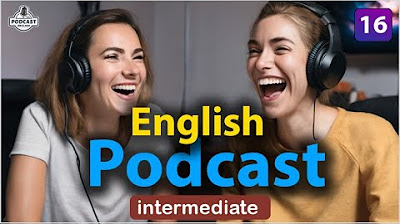EnglishPod 62 - Advanced - Job Interview 2
Summary
TLDRIn this English Pod episode, hosts Marco and Erica explore the advanced lesson of job interviews, focusing on discussing educational background and work experience. They introduce key vocabulary such as 'major,' 'minor,' 'bachelor's degree,' and 'master's degree,' and provide insights into using 'hence,' 'pursue,' and 'strive' effectively. A dialogue illustrates how to articulate one's educational and professional journey, emphasizing the importance of specificity and positivity. Tips for interview success include highlighting continuous learning and achievements. The episode concludes with a quirky question about being a tree, inviting listeners to share their unique job experiences and educational backgrounds on their website.
Takeaways
- 😀 The podcast episode focuses on an advanced English lesson for job interviews, specifically discussing educational background and experience.
- 🎓 The hosts introduce vocabulary related to education, such as 'major', 'minor', 'bachelor's degree', 'master's degree', and 'PhD'.
- 📚 The dialogue in the podcast provides examples of how to discuss one's educational background, including majors, minors, and postgraduate studies.
- 💼 The episode also covers how to talk about work experience, emphasizing the importance of being specific and highlighting achievements.
- 🔍 The language takeaway section highlights seven key words to use in a job interview, such as 'course of study', 'track', 'hence', 'pursue', 'strive', 'breadth', and verbs like 'supervised', 'coordinated', and 'implemented'.
- 🌟 The dialogue demonstrates the use of these words in context, showing how to effectively communicate one's educational and professional qualifications.
- 📈 The podcast suggests providing concrete examples and numbers to illustrate work achievements, such as reducing a company's churn rate.
- 📘 It's important to keep the discussion positive when talking about past jobs and to focus on continuous learning and skill improvement.
- 🌳 The episode ends with a light-hearted discussion about unusual interview questions, like 'If you were a tree, what kind of tree would you be?'
- 💬 The hosts invite listeners to share their own job experiences and thoughts on the discussed topics on the podcast's website.
Q & A
What is the main focus of the second part of the job interview series discussed in the script?
-The main focus is on discussing educational background and experience during a job interview.
What does the term 'major' refer to in the context of education?
-A 'major' refers to the main subject that one studies in university.
How is the term 'major' used as a verb in the context of education?
-As a verb, 'major' is used to describe the act of focusing one's studies on a specific subject, as in 'I majored in history.'
What is the difference between a 'major' and a 'minor' in a university degree?
-A 'major' is the primary field of study, while a 'minor' is a secondary field of study that requires fewer courses than the major.
What is a bachelor's degree and how is it typically obtained?
-A bachelor's degree is an academic degree awarded after completing at least four years of study at a university.
What is the difference between a master's degree and a PhD in terms of focus and requirements?
-A master's degree is more specialized and typically requires two years of study after a bachelor's degree, while a PhD (Doctor of Philosophy) is the highest academic degree, often requiring five or six years of study and involves extensive research.
What is the significance of the term 'course of study' in the context of the dialogue?
-The term 'course of study' refers to a planned or structured program of study that a student follows in higher education.
How does the term 'track' relate to a student's educational path?
-In education, 'track' refers to a specific area of study or specialization within a broader field, guiding the student's focus and courses.
What does the conjunction 'hence' imply when used in a sentence?
-The conjunction 'hence' implies a cause-and-effect relationship or a reason for something, similar to 'therefore' but with a more formal tone.
What does it mean to 'pursue' a degree or a goal?
-To 'pursue' a degree or a goal means to actively seek or strive to achieve it.
Why is it important to mention continuous learning and professional development during a job interview?
-Mentioning continuous learning and professional development shows the interviewer that the candidate is committed to staying current in their field and improving their skills, which can be a positive indicator of their work ethic and adaptability.
What is the significance of providing specific examples and numbers when discussing work experience in a job interview?
-Providing specific examples and numbers allows the interviewer to quantify the candidate's achievements and contributions, demonstrating tangible results and a clear understanding of their impact on previous roles.
Why should a candidate keep their responses positive when discussing previous work experiences during an interview?
-Keeping responses positive helps to maintain a professional tone and avoids potentially negative impressions. It allows the candidate to focus on their strengths and aspirations rather than dwelling on past issues or conflicts.
Outlines

此内容仅限付费用户访问。 请升级后访问。
立即升级Mindmap

此内容仅限付费用户访问。 请升级后访问。
立即升级Keywords

此内容仅限付费用户访问。 请升级后访问。
立即升级Highlights

此内容仅限付费用户访问。 请升级后访问。
立即升级Transcripts

此内容仅限付费用户访问。 请升级后访问。
立即升级浏览更多相关视频

English Boost Level Up Your Skills | English Podcast Conversation | Episode 02

English Learning Podcast Conversation Episode 17 | Intermediate | English Speaking Practice Podcast

Powerful Podcasts for English Fluency | Episode 10

Powerful Podcasts for English Fluency | Episode 09

Powerful Podcasts for English Fluency | Episode 16

English Learning Podcast Conversation Episode 8 | Elementary | Podcast To Improve English Listening
5.0 / 5 (0 votes)
